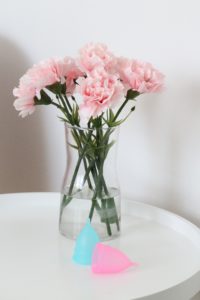Dear Dumplings, I’ve waited a short while before writing this article, since a lot of the learning and changes I experienced during my Menstrual Medicine Circle, have needed to settle, germinate, and for me to tend to the first shoots of personal growth. So, generally all the things you need to do when allowing deep personal change crystallize and embed organically and fully.
A couple of months ago I was fortunate enough to have a Menstrual Medicine Circle session with the lovely Jane Legge (Menstruality Educator and a Mentor with the Red School). I can honestly say that the reality of the Menstrual Medicine Circle itself completely surpassed any expectations I had beforehand. It was a transformative, emotionally and personally liberating journey within myself. The healing and deep self-realizations that I experienced, were far more profound than I’d expected from just one session.

Before the session: Preparation
Before the actual Menstrual Medicine Circle took place, Jane sent me a questionnaire, to explore and help me take a closer look at my own relationship with my menstrual cycle, and the cycle itself. This included things like looking back to my menarche (first menstruation), to menstrual symptoms, and charting and recording my whole cycle, using a few words every day to sum up how I was feeling. This included things like any noticeable themes, energy levels, moods, significant dreams, etc. It felt like this preparation stage was a kind of where the Medicine Circle started: at an approachable, friendly, safe level.
What I learned (about myself) before the session
To be honest, the whole subject of menstruation for most of my life, has not been something I’ve looked at in the most positive light. From difficult and not really supported early years, through being on the contraceptive pill for about a decade, through to extremely heavy bleeding caused by fibroids once I stopped taking the pill—and then having to fight hard to get the surgery to remove the fibroids (rather than more hormone-based treatment), for well over a year. For most of my life as a menstruator, I’ve felt like my menstrual cycle was a hindrance—a bit of a millstone round my neck, to be dealt with as efficiently and conveniently as possible, to minimize its disruption to the realities of life.
Attitudes towards menstruation
I really feel that a lot of this attitude is to do with the perspective our patriarchal society puts on menstruators’ bodies. We’re given an unrealistic and unhealthy perspective on what our bodies should be like, and whom they’re actually for. In some ways, it feels to me as though menstruators’ bodies are perceived almost as a product, or an object which others have more of a right to an opinion on, than we do ourselves. And maybe as a result of this, many menstruators I know feel a sense of disconnect between their physicality and their emotional/mental/spiritual aspects. Bleeding, we’re led to believe, is an inconvenience; a trick played on women (and more importantly, on men) by Mother Nature, making us unclean, sexually untouchable, volatile, irrational, and dangerous/unpleasant to be around. Stop me if you’ve heard this one! Our relationship with our bodies and our cycles has been taken out of our hands, and the natural, beautiful fertility cycle has been reframed as a “dirty little secret” or something that’s wrong with us. And on some levels there’s still a reticence about anything to do with our menstruation in front of non-menstruators. This all works to keep a natural, powerful process (which none of us would be here without) as a taboo.
For me, looking back at my menarche after more than 30 years, and with a friendly compassionate eye, helped me to change the dynamic of my relationship with myself at age 12. My first menstruation was not the most positive of experiences for me (I’m sure I’m not alone in this). The main thrust of the message I got from my mother and some of her friends went something like this: “Aha little girl! Now you’ll find out what womanhood is really like, and there’s no turning back. Also, no men or children, or anyone other than someone else who’s menstruated will ever understand it. The secret has been passed down to you now, and you must guard it with your life” and “yes, periods are a nightmare, but at least they’re not as bad as “The Menopause” (cue horror film music)—in fact as horrible as periods are, I actually started to miss them when I got “The Menopause.”

Shhhhhh!
And so it continued… the competitive sharing of tales of menstrual-related embarrassment and humiliation, the social and practical nightmares of ill-preparedness, gut-wrenching pain (“second only to childbirth”), fainting fits in the workplace, epic leaks while wearing white trousers in public (shock, horror!). It was hardly the most supportive or helpful of initiations—this was my induction, and nothing else. When I asked for guidance as to how to work out my cycle, well I was given a vague idea that in time I’d just magically get to know it. It was apparently supposed to be a big mystery, and if I tried to chart or work out when I was due, that was a waste of time, since my body was now apparently always working against me, and would probably thwart my plans and start early to teach me a lesson. Frankly if I had a time-machine, I’d go back and give little Ema a big hug and some down-to-earth practical advice, right now!
The Menstrual Medicine Circle session itself
Coming back to 2020. On the big day, I joined our Zoom session wearing some comfy clothing, actually sitting on my bed, so I could lie down and completely relax, with no disturbances during the session. Jane talked me through the process itself, and we discussed what intention I would set for the session. When that was decided, we left that intention as a presence rather than a focus, and the session itself took its own structure.
(Note: reviewing my session afterwards, I found that my intention had been fulfilled naturally. What I had asked for unfolded during the session, in its own beautiful, powerful way.)
The Menstrual Medicine Circle itself took the form of a guided, interactive meditation. Jane held the space, and guided me through an imaginal representation of my cycle, as a circle made up of the 4 seasons. Interestingly enough, the seasons align and correspond with the 5 elements theory of Traditional Chinese Medicine, beautifully.
The 4 Seasons of the menstrual cycle

The lunar cycle
Winter
Winter is the menstruation—the death of the year and the cycle, which is needed so that new life can flow. In winter, we feel more inward-facing—and our bodies and minds have a yearning to rest. Honoring this in some way is really important for nourishing and nurturing the germinating seeds of the new cycle, so that we can be reborn anew, in Spring. This is the most Yin phase of the cycle, which means that the physical aspect of our body takes center stage. It tends to have an inwards-flowing direction and in Traditional Chinese Medicine, also relates to the Water element.
Spring
Spring is the pre-ovulation phase, and also relates to young womanhood. It’s a time of fresh new shoots, celebrating and cherishing ourselves and everything we’ve brought with us from the last cycle. It’s a time of bright potential, awakening from our winter slumber; of new ideas and fresh clarity of perspective. But it’s also a time when that tenderness can mean we’re more emotionally vulnerable; so it’s really important for us to care and tend to our own needs during this phase, and give ourselves plenty of encouragement.
Summer
Summer is ovulation. We’re at the pinnacle of our potential creativity and productivity at this point. This also means that the only way to go from here, is to begin the descent back to Winter. Summer is when we’re at our most outwards-facing and sociable—we have bags of energy, our resilience and capacity are at their highest, and this season is when we’re most likely to experience a “flow state,” where our creativity, inspiration and the world around us seem to be in perfect harmony, intuitively.
Autumn
Then we move on to Autumn—the pre-menstruum. We can reflect on the beauty of Summer’s achievements, reaping the harvest. At this point in our cycles, we’re most likely to experience the “inner critic” as we reflect and review everything from the current cycle, looking for lessons and improvements to take forward. If we realize that this is a natural time for reviewing, and make sure that we review the positives as well as the criticisms, that can take some of the sting and heaviness of self-judgment away from the process. Having/identifying areas for learning and growth actually means that we’re alive and still capable of personal development. It’s OK to be where we are in autumn, and it’s OK for us to decide with the wisdom of that season, what to take with us into Winter.
For me, I noticed that I had a real sense of sadness during Autumn—I felt a sense of loss and a desire to cling onto the Summer that had just past.

Empowerment: celebrating who we are
Empowerment—accepting differences
I found it so empowering and enlightening to learn about these changes and phases over the course of a month. It highlighted the fact that I’d previously been judging myself for not being or feeling the same all month long, as though there was something wrong with me for not being more “stable.” In fact, that’s a difference between non-menstruators (whose natural rhythm is daily rather than monthly) and menstruators—and that difference just means that our bodies work differently, not that one is inferior to the other.
Working with, rather than against, myself in my cycle
I now understand that my ups and downs, my changing moods and capacities over the course of a month are all natural phases we all experience as menstruators. And this means that I can see the changing seasons as a flowing backdrop or environment that my “self” lives in, and the context within which I experience life, and the world around me. I have found a growing sense of being grounded and centered in myself, when I see these phases as things I’m naturally going to experience, rather than as things that define who I am. I feel less blown about and dictated to by them. And now I’m learning that I can respond and interact with more wisdom and inner power, when I stay connected to, and working with my cycle.
Beautifully held space—safety to explore and be heard
Jane guided me through each season in turn, then finally back to the first season again, to see what had changed and what it was like now. I described what I experienced, and explored some of the themes that felt most present and wanting attention. Jane was caring, sympathetic, and held the space beautifully, which allowed me to feel safe and nurtured. Because of that, I was able to sit with some difficult emotions, and see how they evolved or clarified. I felt heard and understood—and not only by Jane, but by myself.

A beautiful safe space to journey within
I discovered that my feelings around my cycle seemed to be around wanting to be and stay in summer (the ovulatory phase, where we have lots of energy and where I feel most “myself” and in that creative flow state) the whole time. This realization has helped me to give myself more compassion, love, and acceptance. It’s been deeply healing in so many ways.
Applying the Medicine to my everyday life
After the meditation, we talked about how I could be more supportive of my need during my cycle. My homework included a daily self-appreciation ritual, where I wrote the word “Cherish” on a card, and put it in a prominent place (on my desk, surrounded by my crystals). Each day I try to make a point of finding one thing to cherish about myself! And during my menstruation, I take a few minutes to check in with myself each day, as I would do with a close friend. I ask myself how I am, and hold whatever comes up with compassion and tenderness. Just that act of coming within, and listening to myself, is remarkably healing and nurturing. I’ve found that taking back some of my own love and compassion for myself, is a surprisingly powerful gesture. I’ve also been changing my perception of menstruation, and gently challenging my lovely partner’s (very normal and caring) standard response of offering sympathy, to a more positive one. I’m thanking my body for all it does, and holding feelings of appreciation, love, and acceptance.
As well as this, I’m starting to try and “walk the talk” around the fact that it’s OK to menstruate, and that having a monthly bleed shouldn’t be treated as an embarrassing or socially unacceptable topic of conversation. This is not as easy as it sounds. Knowing and thinking something like this is entirely different from breaking the safe boundaries of what’s considered “polite conversation”—even writing this article, I’ve felt the instinctive wrench to self-edit, and stop over-sharing on a subject which society would have me believe no one wants to hear about. But the menstrual cycle is a beautiful continuum, which around 50% of the world’s population lives through at one stage or another. While our cycles brings challenges, they also give us strength, wisdom, and so many other amazing qualities and insights that the world would otherwise miss out on. We can learn to work with our cycles, to live in harmony with our experience of the world, accepting the challenges, learning and growing, and embracing the strengths offered by each phase; rather than suppressing, struggling, or just ignoring them altogether.
Another couple of changes I’ve made, which Jane suggested, have been to cut right back on caffeinated drinks during Autumn and Winter, and on greasy or sugary “comfort foods” in my Winter. I’m also adding in more leafy greens during Winter, which (as well as being a great source of iron, which is used in the production of blood) help to support the liver in breaking down and processing all the hormones which are in the body at that point. Both of these are helping reduce my menstrual cramps, and it feels lovely and lifting to be caring for my body’s special dietary needs during my bleed.
It’s only just begun…
While I have already felt so many benefits from my Menstrual Medicine Circle and have begun redefining my relationship with my cycle, I do feel like this process of learning and growing, building a relationship with myself, is probably going to be a lifelong one. And for me, that feels right—because the whole cycle is an evolutionary process. I just wish I’d learned about this earlier in my life! If all young menstruators were taught about this as part of their education, I absolutely believe that the empowerment and strength we’d see as a result, would be a major and decisive step forward in redressing the imbalances in our patriarchal society!
__
Photo: Unsplash




